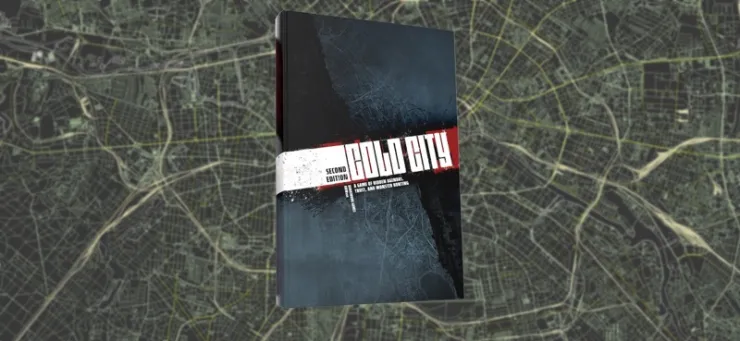I had a quick read of this last night so these are just first impressions. (ed’s note: this was originally posted on my Discord)
The engine is punchy, narrative-first. It’s d10 dice-pool vs. dice-pool. Both sides roll; whoever has the higher single die wins. Your “successes” are every die above the opponent’s highest die (ties are broken by who has more of that top number). It reads fast at the table and makes outcomes feel decisive.
Building pools is clear and character-driven. PCs add their relevant Attribute (Action/Influence/Insight), then layer in Traits, Trust, Hidden Agendas, and a single “Tool” (+2 dice) if it makes sense in fiction. The GM (“Control”) pulls from themed opposition pools (Berlin, External Enemies, Internal Enemies, Monsters, and, when allowed, The Cold). It guides everyone to justify dice with the fiction rather than fishing for modifiers.
“Make it Easy / Hard / Complicated” is a great pacing lever. When conflict is declared, Control offers: let the players win for free (“Easy,” Control banks 2 dice), roll it out normally (“Hard”), or roll it with The Cold added (“Complicated”). Players can refuse “Complicated,” but Control still gets +2 dice. If a Cold die is Control’s highest, even on a loss, the Cold War twists the outcome with extra complications. It’s a neat, visible pressure valve on tone and difficulty.
Trust + Hidden Agendas are spicy. Every PC assigns Trust to teammates and writes personal / national Hidden Agendas. You can spend an ally’s Trust in you for bonus dice when they help or flip it: betrayal grants you bonus dice equal to their Trust in you. Gently (or not so gently) pulls the team toward tense trade-offs without forcing PvP slugfests. I can see this working well in some groups and being a cause of friction with others but if you can’t have a bit of betrayal in spy game, when can you?
Consequences, not hit points. Win/loss plus the number of successes dictate narrative fallout (“Consequences”) rather than incremental damage. That fallout can bruise bodies, strain minds or relationships, break tools/position, and shift Trust. It keeps scenes moving and lets victories still sting (and defeats still teach). The rules keep saying “only roll when the outcome will meaningfully change the characters/story,” which reinforces that vibe.
What reading it feels like. Berlin 1950 is pressure cooker: investigative scenes that slide into hard choices; favors traded with agencies; a monster or border-science artifact is rarely the only problem. Even when the PCs “win,” The Cold can curdle results…. suspicion, blowback, and moral cost are part of the texture. It’s gritty paranoia seeps through.
The setting is strong and specific (with scope to roam). You get a proper Berlin gazetteer (street map and sectors), many factions (SIS/GRU/MGB/GK-11, etc.), and ISLAC as the Allied monster-cleanup outfit. Sample “situations” push moral/political choices, not just “hunt the thing.” There are hooks beyond Berlin (e.g., Soviet Krasnoyarsk-14 and Projekt 303) but feels like backdrop. Berlin is where the fun is I think.
Border science sets the tone (and the boundaries). The book frames Nazi “border science” as fringe/occult tech that ripped holes in reality (a bit like Achtung! Cthulhu). There are converters, portals, resurrectors. And adds a clear disclaimer about pseudo-history. It’s a supernatural conspiracy frame with care around sources and ethics, which I appreciated.
Collaborative scaffolding is excellent. Before play you collectively pitch tones, scenes and places, and set Control’s five Dice Groups (start at 5 dice each for multi-session play, then each person adds 2 dice to a chosen Group). It aligns expectations and literally dials which threats matter more this arc.
Crunch vs. fluff. Very light rules, but with purposeful knobs: three Attributes (1–5), freeform Traits (including Negative Traits), Trust matrix, Agendas, and a single Tool bonus. No skill lists, no weapon stat blocks; guns and gear are fictional positioning (+2 Tool), and fights are just conflicts with Consequences. The only “tracking” overhead is Control’s five dice pools and occasionally The Cold. I’d call it rules-light with a strategic resource layer for the GM.
Swinginess cuts both ways (in a good way). Because victory hinges on your highest die and how many dice beat theirs, a single lucky 10 can flip a scene but large pools still matter because they’re more likely to clear the opponent’s apex die multiple times. Tie-breaking by canceling matched top numbers adds just enough texture. It reads dramatic, not random. I do wonder if really big pools would slow resolution down but probably a fringe concern / easily remedied with some bespoke dice rollers in online play.
Long-term play questions. The Trust/Betrayal loop is potent (and fun) but will shape a group’s social contract; I’d set probably norms about how often to twist the knife and what “betrayal” means in play. The GM dice economy gives you act-level pacing, but does ask the GM to track five pools. Simple, yet it’s the main “crunch.”
I’m tempted to run it and see it itches the same itch as Achtung! Cthulhu without quite as much crunch although the former game is probably better for tactical playstyles. The espionage / Cold War paranoia is the thing that most appeals to me. Definitely needs a GM and group who are comfortable improvising and rolling with the narrative.
